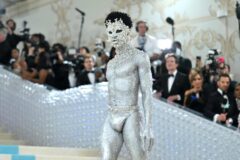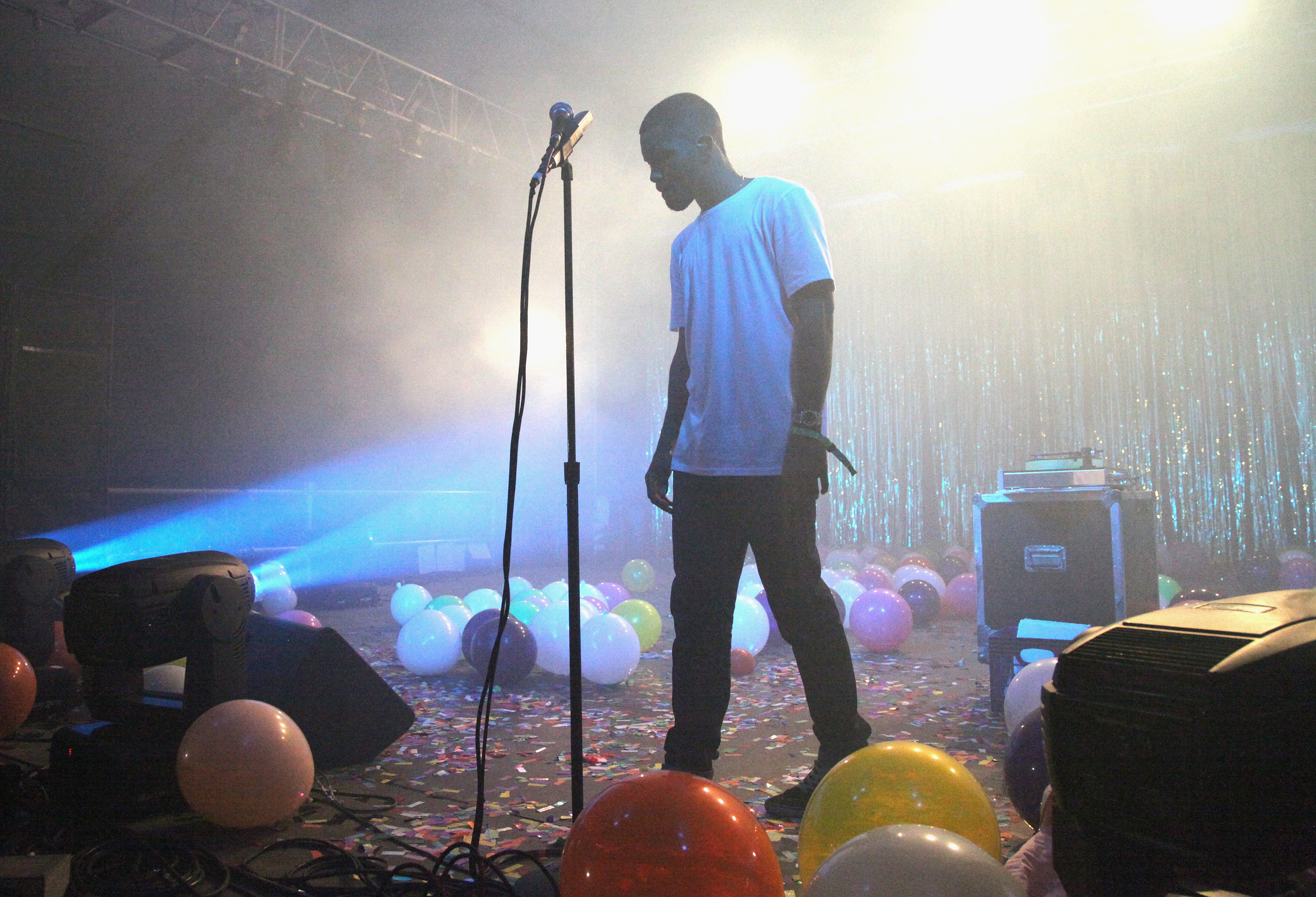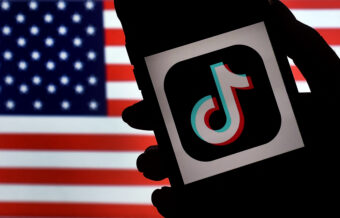On “We All Try,” a carefully made declaration from Frank Ocean’s breakthrough mixtape, nostalgia, ULTRA., the enigmatic singer proclaims: “I don’t believe in time travel.” He does believe in war, heaven, God; he believes in a woman’s right to choose, “but baby don’t abort.” He believes in same-sex marriage, foreshadowing the TextEdit.doc heard around the world, in which he acknowledged his love for another man. He believes our lives are complex; he thinks the moon landing was a hoax. He believes in sin. That was 2011.
Nostalgia, ULTRA. came out in February, on the same day that Tyler, the Creator and Hodgy Beats played “Sandwitches” on Late Night With Jimmy Fallon. The Odd Future buzz was reaching a fever pitch. Tyler’s Goblin would come out that May, and despite tepid reviews and an absurdly bloated running time, would survive as one of 2011’s most discussed, dissected, and — in some circles — revered albums. Earl was still in Samoa and would be there for another 12 months. The Frank Ocean tape wasn’t what Odd Future was staked on: It was calculated, it was thoughtful. The cocaine crusted onto countertops was treated suspiciously (yikes). Everybody loved it.
When the long-anticipated Boys Don’t Cry comes out tomorrow, it’ll be Frank’s third major project in five years, but that’s misleading. The last Frank Ocean record came out before Mitt Romney accepted the Republican nomination, before Beyoncé irreparably changed the album rollout, before the Supreme Court upheld marriage equality, and — in many ways — before Ocean was a superstar.
Despite his obvious talent (and stellar PR outfit), that ascent’s been puzzling: Frank’s only landed in the Hot 100 twice, never higher than No. 32. He’s collaborated with some of pop’s biggest stars, but those sessions have yielded slow burns (Beyoncé’s “Superpower”), buried album cuts (Jay Z’s “Oceans”), or uncredited turns on political screeds (Kanye West’s “New Slaves”). In a decade marked by quick turnover and comically short news cycles, Ocean’s stature seems to grow unfettered and uncontrollably while he lays low, joining a short list of superstars without so much as a stray single. What’s happening, if not time travel?

Also Read
GAY RAP
https://youtube.com/watch?v=TMfPJT4XjAI
Christopher Edwin Breaux was born in Long Beach in the fall of 1987. (In the spring of 2015, Breaux went to a Los Angeles courthouse to change his legal name to Frank Ocean, who he’d been for years.) But when he was still a toddler, he and his parents moved to New Orleans, where a French surname is perfectly at home.
From the time he was young, Breaux wanted to make music. He’d wash cars, mow lawns, walk dogs to finance studio time. But in August of 2005, when Breaux was 18 and had just enrolled at the University of New Orleans, Hurricane Katrina ravaged the city. The storm didn’t directly displace Breaux, but it ruined the studio he’d been using to record. He drove to L.A. for a six-week reprieve that’s lasted, to this point, over a decade.
A few demos turned into a few meetings turned into writing credits for songs by Brandy, Justin Bieber, John Legend. But Breaux — very nearly Ocean — was still hoping to break through as a solo artist. In 2009, he met the core of Odd Future; the conflicting histories they gave the press when they blew up improbably implied Frank was skateboarding with Tyler back in ‘06. By January of 2010, the ink was dry on a Frank Ocean contract with Def Jam, and Odd Future quickly became the perfect launchpad for a solo career.
Almost exactly five years before nostalgia, ULTRA., Ne-Yo put out his debut record, In My Own Words. Like Ocean, Ne-Yo was long respected as a songwriter for others before he stepped out with an album under his own name. And while that LP went platinum at the tail end of the record industry’s boom years and spawned a very successful three-year run, it wasn’t the catalyst for a seamless and boundless upward trajectory like the one Ocean seems to be riding. In My Own Words was nominated for the Contemporary R&B Grammy in 2007. It lost to Beyoncé.
Frank Ocean’s music is reactive, finely attuned to the world around him. He’s a writer down to his nerve endings, accruing details that others treat as white noise — the kind of pen his girl writes him with, the dogeared corners on another woman’s passport.
As a vocalist, Frank opens up for expansive, powerful passages, but spends much of his time in slick conversational tones. It’s a distinct style; that’s why nostalgia, ULTRA. feels like a hyper-focused genre experiment even as he sings over Coldplay and MGMT songs. Across sub-genres, R&B often aims for grand gestures and huge epiphanies, but “Novacane,” his first foray into radio on his own terms, plays like a weekend at Coachella recounted by text message. It’s casual, and that’s what makes its rough edges cut so deep.
The week nostalgia, ULTRA. came out, Usher won a Grammy for Raymond vs. Raymond, an album that’s almost certainly slipped from or been pushed out of your memory, despite the then-unavoidable “OMG” and “Hey Daddy.” It was supposed to be Usher’s divorce album, but was better characterized by its cloying plays for radio, the first time he sounded aware of his age. Raymond vs. Raymond beat out R. Kelly’s minor Untitled, and Graffiti, Chris Brown’s worst and worst-selling album.
https://youtube.com/watch?v=yORwhIwEAoY
Beyoncé’s self-titled album — the one for which Frank wrote “Superpower” — is often (correctly) cited as a watershed moment for the promotional rollout. It erased a decade and a half of turmoil for the RIAA, where months-early leaks crippled record sales, and even routine week-early advances could be damaging with poor word of mouth. The second the industry’s powers that be figured they could do away with that roulette game, they did.
But Beyoncé wasn’t the first appointment listening session that involved Frank. In August of 2011, half a year after nostalgia, ULTRA., Kanye West and Jay Z dropped Watch the Throne, a sprawling meditation on race and Margiela. Frank sang on “Made in America” and “No Church in the Wild,” the latter opening the album and becoming an instant fan favorite. The digital version came out weeks before the physical; everyone heard Frank Ocean become a star at the same time.
The following summer, Frank was still playing fast and loose with the calendar. He announced a handful of dates, some explicitly and others as cryptic messages, for his debut album channel ORANGE. Eventually July 17 was the company line; on July 9, he played “Bad Religion” on national television and put the album up for sale on iTunes shortly after. The performance was on Fallon.
Cocaine dilates time in the simplest, least dissociative way. You don’t leave your body or have visions; you stay up all night haggling with cab drivers and looking for more cocaine.
“Crack Rock” is based on Frank’s memories from NA meetings his grandfather, himself a former addict, ran during Frank’s childhood. He — Breaux, then — would sit in on the meetings, letting a deep fear of addiction seep into his bones. One after another, the visceral indignities (waking up in cold sweats in Little Rock) add up to an epidemic, systemic and familial, but from a close enough vantage point, they’re just terrifying scenes.
Channel ORANGE works the same way your memory works. You don’t recall long, linear narratives — your past comes back to you in disjointed parts, overwhelmed by single senses, missing pieces, and timestamps. You conjure villains and victories out of thin air, play out the climaxes over and over.
Before the album came out, but after songs had been played for some journalists and industry figures, whispers started about Frank’s songs that used male pronouns or otherwise suggested a same-sex relationship. So on the Fourth of July, he posted a letter that he’d written in December of 2011, that addressed the unrequited love he’d felt for a man in 2006. But just like his music, Ocean’s letter defied categorization, treating sexuality as what it is for many: an in-the-summer reaction to the person in front of you.
To the untrained eye, Boys Don’t Cry is entering a world vastly different from the one channel ORANGE was picking apart. Blockbuster albums routinely receive the element-of-surprise treatment. Sometimes (Kanye) it’s so songs can be tweaked up to the last minute; others (Earl) because the shock is a serviceable stand-in for a hit single.
Gay Americans continue to be vindicated in our court system, all the while confronted with open bigotry and legislative pushback from social conservatives — to say nothing of violent acts like the grotesque shooting in Orlando. Frank’s been an outspoken advocate, but has managed to avoid his music and public identity being reduced to his sexuality — a luxury not afforded to all. In the crudest sense, that’s a measure of fame: Frank’s work has cut through the din so clearly that he’s able to sidestep easy categorization.
His music has also proven slightly ahead of its time. As hip-hop ceases to be the driving force behind Top 40, R&B stars are free to pull whichever pieces they want from the genre, in contrast to the early 2000s when singers were pushed toward tacked-on guest verses and rap-centric drum programming. Ocean’s tendency toward structure-busting songwriting and long tangents has come further en vogue in his time away, and makes records from the early part of this decade sound current today.
So this is the only time Frank Ocean could come back, isn’t it? His music is tailored specifically to soundtrack whatever f**ked-up things you do at the end of summer, week-long flings and lying iMessages included. His work flits back and forth between intensely personal, intensely specific bits of grey matter, then opens wide for confused musings on the Outside World. It’s designed to seep into your own memory, to help track the passage of time by making you aware that time’s passing.
Twenty years from now, you’re going to remember Frank Ocean songs — or more likely, parts of songs, hooks and melodies you can’t quite place. You’re going to tie them to events in your own life: This came out when you were living with the boy in Fresno, the girl from Paris, in the apartment on top of your second-favorite bar, when you didn’t think so far ahead. You remember singing it to yourself. Then you’re going to tab over to Wikipedia to check precisely when the song came out, and see that you’re off by 18 months, that you couldn’t have been humming “Pyramids” when you dropped out of school because it hadn’t come out yet. And you’ll think, that can’t be right, that’s not how it is in my head. You’ll be wrong, but it won’t matter — after all, memory is a dying world.




